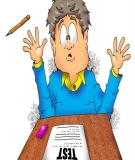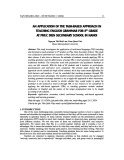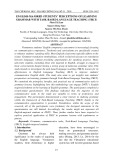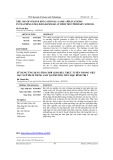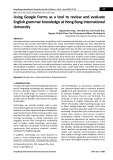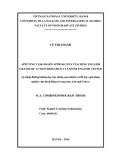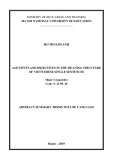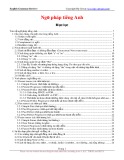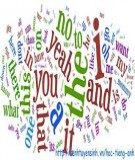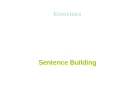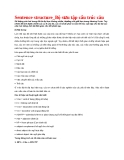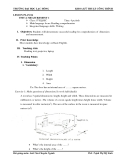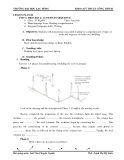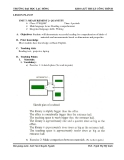Are they speaking English? Are they speaking English?
Why is pronunciation important ? Why is pronunciation important ?
““I went to the US in 1996 for the first I went to the US in 1996 for the first
time. Whenever I spoke to a person in time. Whenever I spoke to a person in America, they kept asking me : "what ? America, they kept asking me : "what ? what ?". I would repeat my sentence again and what ?". I would repeat my sentence again and again. Finally, they would say "Ahha!" and again. Finally, they would say "Ahha!" and then repeat my sentence, using exactly my then repeat my sentence, using exactly my words ! It was embarrassing! I knew my words words ! It was embarrassing! I knew my words and grammar were correct but nobody would and grammar were correct but nobody would understand me just because of my understand me just because of my pronunciation. I am very motivated to learn pronunciation. I am very motivated to learn English and the right pronunciation and English and the right pronunciation and ” Mike said phonetics now” Mike said phonetics now
I meet many people with high level ““I meet many people with high level
of grammar and vocabulary in English of grammar and vocabulary in English at work. However, they can't express at work. However, they can't express themselves correctly because of too many themselves correctly because of too many bad mistakes in pronunciation. I keep bad mistakes in pronunciation. I keep telling them that the key to the good telling them that the key to the good comprehension and speaking in English comprehension and speaking in English is good pronunciation but they don't is good pronunciation but they don't seem to be much worried about that.” ” seem to be much worried about that. Chantal said Chantal said
Pronunciation is important because it makes your first ““Pronunciation is important because it makes your first impression. impression. Many English learners ignore pronunciation. They can Many English learners ignore pronunciation. They can communicate in class, so they think they are good communicate in class, so they think they are good enough. They say "I don't need to study pronunciation. enough. They say "I don't need to study pronunciation. I just want to communicate in English." I just want to communicate in English." They think that they communicate in English because They think that they communicate in English because they can communicate with their teacher and other they can communicate with their teacher and other students. You have to remember : students. You have to remember : * Your teacher has been listening to bad pronunciation * Your teacher has been listening to bad pronunciation for years. He or she can understand it much easier than for years. He or she can understand it much easier than Shilly said the average person.”” Shilly said the average person.
* Other students are usually from the same * Other students are usually from the same country as you. therefore, they speak English country as you. therefore, they speak English like you and they make the same mistakes. So like you and they make the same mistakes. So it's easy for them to understand you. it's easy for them to understand you.
The good news is that you can work on your The good news is that you can work on your pronunciation until you speak pronunciation until you speak "understandable and pleasant English" (good "understandable and pleasant English" (good pronunciation). You can learn the sounds of pronunciation). You can learn the sounds of English, listen to recordings, watch English English, listen to recordings, watch English language television, etc. But first you have to language television, etc. But first you have to realize there is a problem ! Most English realize there is a problem ! Most English learners don't. learners don't.
̣ ̉ ̣ ̉ ]ə ə l ]ə ə l [æl'vi [æl'vi
̣ ̃ ̣ ̃
['neiz l]ə ['neiz l]ə
́ ́ ̉ ́ ́ ̉
['kæviti] ['kæviti] ̀ ̣ ̀ ̀ ̣ ̀
̉ ̣ i ga ( trên cô hong i ga ( trên cô hong )) ̉ ̣ ['vi:l m]ə ['vi:l m]ə
̀ ̣ ̀ ̣ ['ju:vjul ['ju:vjul ]ə ]ə
̀ ̣ ̀ ̣
['pæl ['pæl t]ə t]ə ́ ̉ ́ ̉
VOCABULARY OF ORGANS OF SPEECH VOCABULARY OF ORGANS OF SPEECH alveolar -alveolar nasal - nasal cavity - cavity - velumvelum - uvula uvula palate - palate pharynx - pharynx epiglottis - epiglottis - larynx larynx glottis - glottis
['færi ks]η ['færi ks]η
[,epi'gl tis]ɔ [,epi'gl tis]ɔ
(thuôc) ô răng (thuôc) ô răng (thuôc) mui (thuôc) mui hô hôc, ô, khoang hô hôc, ô, khoang vom miêng mêm vom miêng mêm l ̀ ở ưỡ l ̀ ở ưỡ vom miêng vom miêng hâu, hong hâu, hong năp thanh quan năp thanh quan thanh quan ̉ thanh quan ̉ thanh môn thanh môn phat âḿ liên quan đ n ế phat âḿ liên quan đ n ế vocal - vocal
['læri ks]η ['læri ks]η ['gl tis]ɔ['gl tis]ɔ
['voukl] ['voukl]
Alveolar Dental Alveolar Dental
Glottal Palatal VelarVelar Glottal Palatal
Manner of Manner of articulation articulation
Palato- Palato- alveolar alveolar
Bi-Bi- labial labial
Labio Labio -dental -dental
StopStop
Place of articulation Place of articulation
Fricative Fricative
p b p b k g k g
Affricate Affricate
t d t d ʃ ʒ ðθ ðθ s z s z ʃ ʒ f v f v hh
Nasal Nasal
t dʃ ʒ t dʃ ʒ
Liquid Liquid
nn ŋŋ mm
GlideGlide
ll rr jj
ww
Explanation of the table Explanation of the table
Place of articulation: v trí c u âm Place of articulation: v trí c u âm ấ ấ ị ị
2 môi Bilabial 2 môi Bilabial
Labio-dental Labio
m t nhai c a hàm răng trên ch m vào phía trong -dental m t nhai c a hàm răng trên ch m vào phía trong
ủ ủ
ặ ặ
ạ ạ
môi d môi d
iướ iướ
đ u l Dental đ u l Dental
i ch m vào b m t trong c a hàm răng trên i ch m vào b m t trong c a hàm răng trên
ầ ưỡ ầ ưỡ
ề ặ ề ặ
ủ ủ
ạ ạ
đ u l Alveolar đ u l Alveolar
i ch m vào chân răng c a hàm răng trên i ch m vào chân răng c a hàm răng trên
ầ ưỡ ầ ưỡ
ủ ủ
ạ ạ
i ch m vào i ch m vào
ạ ạ
ph n thân (tr Palato- Alveolar (post-alveolar): ph n thân (tr Palato- Alveolar (post-alveolar): ph n sau c a chân răng. ủ ph n sau c a chân răng. ủ
ầ ầ n ở ướ n ở ướ
c) l ướ ưỡ c) l ướ ưỡ u, ng c c ng) ạ ứ u, ng c c ng) ạ ứ
ầ ầ
Âm ( (Âm
Palatal ph n thân (tr ph n thân (tr ầ Palatal ầ
c) l ướ ưỡ c) l ướ ưỡ
i ch m vào ph n c ng c a vòm ầ ứ i ch m vào ph n c ng c a vòm ầ ứ
ủ ủ
ạ ạ
mi ngệmi ngệ
VelarVelar ph n thân l ph n thân l ầ ầ
ưỡ ưỡ
i ch m vào ph n m m c a vòm mi ng ề i ch m vào ph n m m c a vòm mi ng ề
ủ ủ
ệ ệ
ạ ạ
ầ ầ
khí qu n khí qu n
thoát qua 2 dây thanh âmâm
ả thoát qua 2 dây thanh ả
không khí đi t Glottal không khí đi t ừ Glottal ừ
c khi c khi
ứ ấ ứ ấ i hoàn toàn tr i hoàn toàn tr
ắ ắ
ướ ướ
ơ ị ặ ạ ơ ị ặ ạ
ở ở
c thoát ra qua khe h bé ở ơ ượ c thoát ra qua khe h bé ơ ượ ở : (âm t c xát) Lúc đ u lu ng h i Affricativeive : (âm t c xát) Lúc đ u lu ng h i ơ ầ ắ ơ ầ ắ
ồ ồ
ự ế ợ ủ ự ế ợ ủ
miêng (s k t h p c a ẹ ở miêng (s k t h p c a ẹ ở : (Âm mũi) Lu ng h i liên t c NasalNasal: (Âm mũi) Lu ng h i liên t c ồ ồ
ụ ụ
ơ ơ
ơ ơ
ể ể
Manner of articulation: Cách th c c u âm Manner of articulation: Cách th c c u âm Stop:: (âm t c) Lu ng h i b ch n l (âm t c) Lu ng h i b ch n l ồ Stop ồ thoát ra ngoài thoát ra ngoài : (âm xát) Lu ng h i đ Fricative: (âm xát) Lu ng h i đ ồ Fricative ồ mi ngệ Affricat mi ngệ i sau đó b ch n l ị ặ ạ b ch n l i sau đó ị ặ ạ thoát ra qua khe h p thoát ra qua khe h p âm t c và xát) âm t c và xát) ắ ắ ượđ c thoát ra qua ượ c thoát ra qua đ khoang mũi khoang mũi : (âm l ng) Lu ng h i di chuy n Liquid: (âm l ng) Lu ng h i di chuy n ồ ỏ Liquid ồ ỏ quanh l ệ quanh l ệ
ưỡ ưỡ
t)ướ t)ướ
i và thoát ra ngoài mi ng i và thoát ra ngoài mi ng
(Âm l GlideGlide:: (Âm l
Places of articulation Places of articulation
/p/ /p/ /b/ /b/
Bilabial: Bilabial: (The lips are pressed together) (The lips are pressed together)
/ v/ / v/
Labiodental fricative: /f / /f / Labiodental fricative: The lower lip is contact with the upper teeth The lower lip is contact with the upper teeth
/ð/ /ð/
/θ /θ/ /
Dental fricative: Dental fricative: The tip of the tongue touches the inside The tip of the tongue touches the inside
/d/ /d/
Alveolar- stop: Alveolar- stop: /t/ /t/ Alveolar- fricative: Alveolar- fricative: /s/ /z/ /s/ /z/ The tongue blade is pressed against the alveolar ridge The tongue blade is pressed against the alveolar ridge
ʒ ʃ ʒ/ / ʃ / /
Palatal Alveolar (postalveolar): The tip or the blade of the tongue articulates with the
Palatal Alveolar (postalveolar): / / / / The tip or the blade of the tongue articulates with the back back area of the alveolar ridge (the middle of the tongue against area of the alveolar ridge (the middle of the tongue against the area behind the alveolar ridge as it rises to the roof of the area behind the alveolar ridge as it rises to the roof of the mouth or palate. ) the mouth or palate. )
Palatal: /j//j/ Palatal: Raising the front part of the tongue to the palate, farther Raising the front part of the tongue to the palate, farther back from the alveolar ridge (The front of the tongue back from the alveolar ridge (The front of the tongue articulates with the domed part of the hard palate) articulates with the domed part of the hard palate)
/g/g / / //k/k/
Velar: Velar: The back of the tongue is pressed against the area The back of the tongue is pressed against the area where the hard palate ends and the soft palate begins where the hard palate ends and the soft palate begins
/r//r/ (The tip of the tongue approaches the (The tip of the tongue approaches the alveolar area in the way it would for /t//t/ alveolar area in the way it would for /d/,, but never makes contact with any or or /d/ but never makes contact with any part of the roof of the mouth. The tongue is part of the roof of the mouth. The tongue is curled backwards with the tip raised) curled backwards with the tip raised)
/p/ /p/
Consonants in CD Consonants in CD /b/ /b/
/z/ /z/
/s/ /s/
/t//t/ / /ʃ/ /ʃ
/d/ /d/ /ʒ /ʒ/ /
/g/ /g/ /d/dʒʒ//
/v/ /v/
/k/ /k/ /tʃ/tʃ// /f//f/ //θθ//
/ð/ /ð/
/l//l/
/h/ /h/
/r//r/
/m/ /m/
/j//j/
/n/ /n/
/w/ /w/
/ŋ/ /ŋ/
ppayay sellsell elephone ttelephone opoptitionon ccopyopy chcheapeap ffileile ththinkink llostost rriseise yyearear wwinin bbuyuy goodss good ddealeal decidecissionion lobal gglobal jjointoint enture vventure ththisis hheadead mmediaedia nnetet brandingng brandi
VOWELS VOWELS Vowels are produced by letting air flow from Vowels are produced by letting air flow from the larynx to the lips without any constraints the larynx to the lips without any constraints Vowels are generally voiced, while English Vowels are generally voiced, while English consonants can be either voiced or voiceless. consonants can be either voiced or voiceless. The vocal cords always vibrate when a vowel The vocal cords always vibrate when a vowel is produced and the continuous stream of air is produced and the continuous stream of air makes it possible to lengthen or shorten vowel makes it possible to lengthen or shorten vowel sounds sounds
Places of articulation for vowels Places of articulation for vowels
Illustrates tongue and mouth shifts for vowel sounds (from Gilbert 2005)
Illustrates tongue and mouth shifts for vowel sounds (from Gilbert 2005)
Monothongs Monothongs
CloseClose
Front Central Back Front Central Back long short long short long short long short long short long short
ɪɪ u: ʊ i:i: u: ʊ
MidMid əə /eɛ/eɛ :ɜ:ɜ :ɔ:ɔ
ɑ ɑ : : ɒ ɔ ɒ ɔ / /
OpenOpen
ʌʌ ææ
VOWELS MONOTHONGS VOWELS MONOTHONGS
/ / ɪ/ / ɪ
Vowel sounds in CD Vowel sounds in CD / :/ɔ/ :/ɔ ck/ fiixx
ququiick/ f
shshorort/ ct/ couroursese
clcleaean/ shn/ sheeeett
ggooood/ bd/ booookk
/ʊ /ʊ/ / /i:/ /i:/
sseell/ wll/ weellll
schschooool/rl/ruulele
/u:/ /u:/ /e/ /e/
bbaad/ bd/ baanknk
mmuuch/lch/luuckck
/ʌ /ʌ/ / /æ/ /æ/
ffirirst/tst/terermm
ə ə :/ :/ :/ ɑ :/ ɑ/ / ɜ smsmarart/ ct/ carardd / :/= / ɜ / :/= /
ttoop/ jp/ joobb
bout/ Canaaddaa aabout/ Can
ɒ ɔ ɒ ɔ / / =/ / / / / =/ /ə /ə/ /
Dipthongs in CD Dipthongs in CD
/e /ɪ/e /ɪ
/əʊ /əʊ/ /
plplayay/ s/ saafefe
ggoo/ sl
/ slowow
/ɪə /ɪə/ /
/a /ɪ/a /ɪ mmyy/ pr
/ priicece
nnearear/ h/ hereere
/ɔɪ /ɔɪ/ /
/ɛə ;;//e /əe /ə /ɛə/ /
chchoioice/ ce/ oioill
ffairair/ sh/ shareare
/a /ʊ/a /ʊ
/ʊə /ʊə/
ddownown/ t/ towownn /
ttourour
VOWELS- DIPTHONGS VOWELS- DIPTHONGS
VOWELS- DIPTHONGS VOWELS- DIPTHONGS
Closing Centring Closing Centring
to / to /ɪɪ// to / to /ʊʊ//
ɪə ʊə Staring close ɪə ʊə Staring close
Starting open aɪaɪ Starting open
eɪ ɔɪ əʊəʊ Starting mid eɪ ɔɪ Starting mid /eɛə ə/eɛə ə
aʊaʊ
SOUNDS IN CD SOUNDS IN CD
Sound
1 2 3 4 5
Examples book arm tie ant ouch
/u:/ /a:/ /ai/ /æ/ /æ/ /au /
Sound
Examples
bat beaten/button
6 7
/b/ /ə /ə/ /
8 9
bee chicken
/i:/ /t /ʃ /t /ʃ
10
drum
/d/
Sound Examples pay mixer
fish goggle hot
11 /ei/ 12 / :/ɜ/ :/ɜ :/ə :/ə/ / 13 /f/ 14 /g/ 15 /h/
Sound
Examples happier
16
/ɪə /ɪə/ /
17 18
ink jam
/i/ /d /ʒ/d /ʒ
19
queue
/ju/ /ju/
20
cat
/k/
Sound
Examples quack lollipop meal pleasure/measured
moon
21 /kw/ 22 /l/ 23 /m/ 24 / /ʒ /ʒ / 25 /u:/
Sound
26 27
Examples net strong
/n/ /ŋ/ /ŋ/
28
goat
/əʊ /əʊ/ /
29
oil
/ɔɪ /ɔɪ/ /
30
on
/ɔ /ɔ/ /
Sound
Examples
31
fork
/ :/ɔ/ :/ɔ
32 38 39 40
puff red/resistance snake hushhush
/p/ /r/ /s/ / /ʃ/ /ʃ
Sound
Examples
41 42 43
head/emperor tennis this
/e/ /t/ /ð/ /ð/
44
three
/θ /θ/ /
45
tour
/ʊə /ʊə/ /
Sound
46 47 48 49
Examples umbrella van wind wary
/ʌ /ʌ/ / /v/ /w/ /ɛə /ɛə/ /
50 51
yoghurt buzz
/e /ə/e /ə /j/ /z/
EXAMPLES OF TRANSCRIPTION EXAMPLES OF TRANSCRIPTION
[in'kæmpm nt]ə [in'kæmpm nt]ə
[im'bær st]ə [im'bær st]ə
['pæki,nesis] ['pæki,nesis]
[,hæbi'tei n]∫ [,hæbi'tei n]∫
[in,kwizi't :ri [in,kwizi't :ri
ɔ ə l] ɔ ə l]
ə ə ə ə
[, up 'lesk] [, up 'lesk]
ɔ ɔ
∫ ∫
ə [, :sk l'tei n] [, :sk l'tei n] ə
encampment encampment embarrassed embarrassed pachynesis pachynesis habitation habitation inquisitorial inquisitorial opalesque opalesque auscultation auscultation fabrication fabrication bibliographical bibliographical
[,fæbri'kei n]∫ [,fæbri'kei n]∫
ə
ə
[,bibli
'græfik l]
ə
ə
[,bibli
'græfik l]
Can you say this sentence below the picture? Can you say this sentence below the picture?







